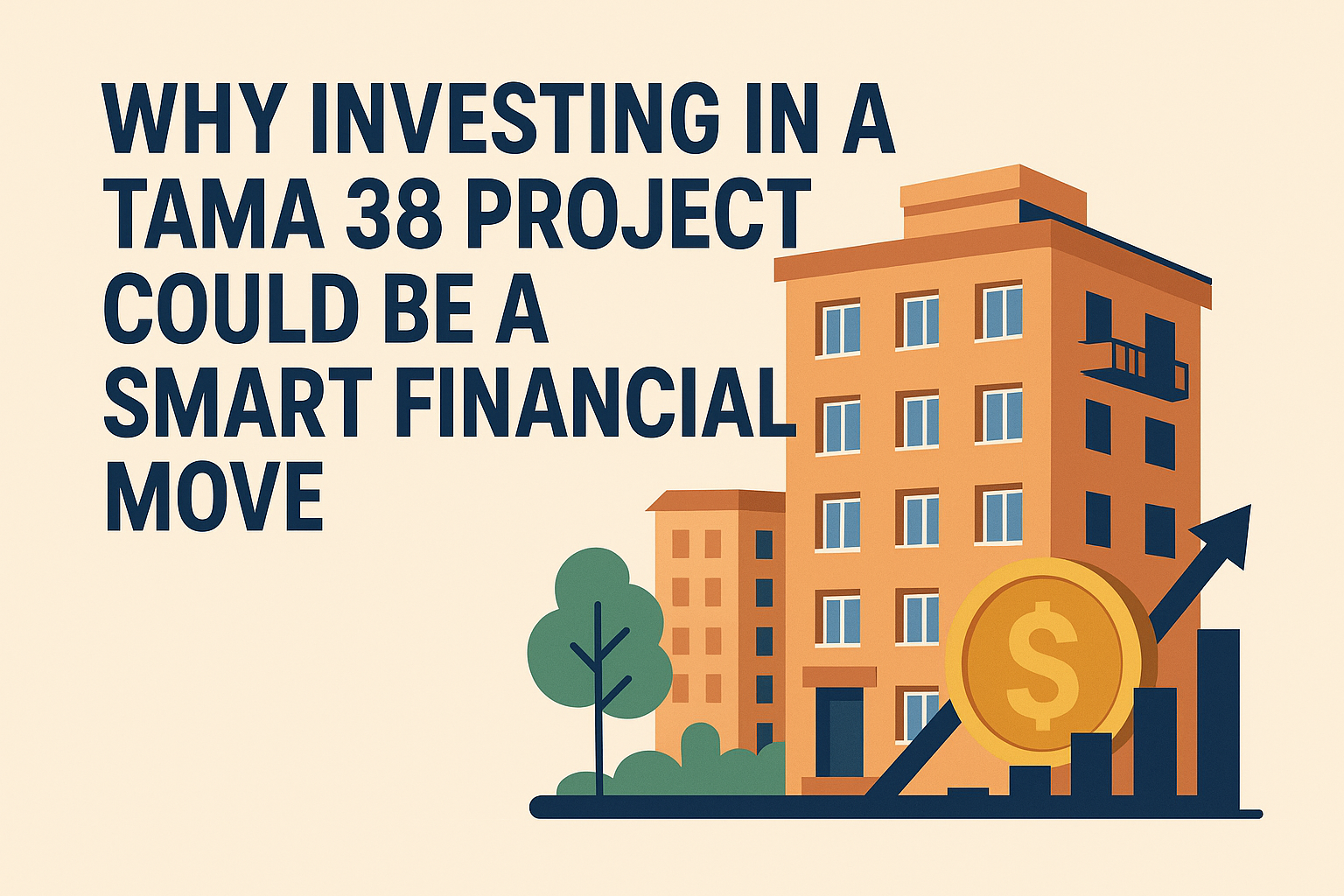Purchasing an apartment in a Pinui-Binui (evacuation-construction) project in Israel can offer significant financial advantages compared to buying in a standard new development. While these projects do involve certain risks and considerations, the potential cost savings make them worth serious consideration for savvy buyers.
Pinui-Binui projects typically offer a price discount of 15-25% compared to equivalent new construction in the same neighborhood. This discount exists because developers need to pre-sell units to secure financing for these complex projects, and because buyers must accept certain uncertainties regarding the final completion timeline. This price gap represents a substantial saving opportunity, particularly in Israel’s expensive housing market.
The primary financial benefit comes from the development timeline. When you purchase during the early sales phase of a Pinui-Binui project, you’re essentially buying at today’s discounted price for a property that will be completed in 3-5 years. In Israel’s consistently appreciating real estate market, this time gap frequently results in significant built-in appreciation by the time you receive your keys. Many buyers find their properties have already increased in value by 10-15% by completion, effectively paying for much of their initial investment through market appreciation alone.
Payment structuring offers another financial advantage. Unlike regular new developments that typically require 20-30% down payment with the remainder due during construction, Pinui-Binui projects often feature more buyer-friendly payment schedules. A common arrangement involves 20% upon signing, with the remaining 80% due only upon project completion. This extended payment timeline allows buyers to continue earning interest on their capital or avoid taking larger loans until actually receiving their property.
The modernization factor also contributes to financial benefits. Pinui-Binui projects replace aging buildings with modern, energy-efficient structures featuring improved insulation, modern HVAC systems, and sometimes solar elements. These improvements typically reduce ongoing utility costs by 20-30% compared to older buildings, creating lasting monthly savings. Additionally, maintenance costs in the initial years are significantly lower in new buildings, avoiding the special assessments and unexpected repairs common in aging structures.
Property tax considerations add another layer of savings. While new apartments generally incur higher arnona (municipal tax) due to increased size and valuation, Pinui-Binui projects may qualify for temporary tax reductions in certain municipalities seeking to encourage urban renewal. These reductions typically phase out gradually, allowing new owners to adjust to the higher rates over time rather than facing an immediate tax increase.
The neighborhood transformation effect can’t be overlooked. Successful Pinui-Binui projects often catalyze broader neighborhood improvements as surrounding buildings follow suit. Early buyers essentially purchase in a transitioning area at pre-improvement prices, often seeing additional appreciation as the entire neighborhood undergoes renewal. This “pioneer advantage” has created exceptional returns for forward-thinking investors in areas like southern Tel Aviv and parts of Bat Yam.
For investors specifically, Pinui-Binui projects offer attractive rental yields. The combination of discounted purchase price and strong rental demand for new apartments typically generates yields about 0.5-1% higher than comparable properties. Additionally, the newer building attracts more stable, longer-term tenants willing to pay premium rents for modern amenities, reducing vacancy periods and tenant turnover costs.
Of course, these financial benefits come with counterbalancing considerations. Pinui-Binui projects carry completion uncertainty, as they depend on complex legal agreements with original residents and multi-stage regulatory approvals. Construction delays are common, sometimes extending expected timelines by 1-2 years. The discounted price reflects these risks, essentially compensating buyers for accepting greater uncertainty compared to standard developments.
For buyers willing to accept some uncertainty in exchange for significant potential savings, Pinui-Binui projects represent one of the few remaining opportunities for below-market purchasing in Israel’s competitive housing environment. The combination of discounted entry price, favorable payment structures, built-in appreciation potential, and reduced operating costs creates a compelling financial proposition for those with medium to long-term housing horizons.
Purchasing an apartment in a Pinui-Binui (evacuation-construction) project in Israel can offer significant financial advantages compared to buying in a standard new development. While these projects do involve certain risks and considerations, the potential cost savings make them worth serious consideration for savvy buyers.
Pinui-Binui projects typically offer a price discount of 15-25% compared to equivalent new construction in the same neighborhood. This discount exists because developers need to pre-sell units to secure financing for these complex projects, and because buyers must accept certain uncertainties regarding the final completion timeline. This price gap represents a substantial saving opportunity, particularly in Israel’s expensive housing market.
Real-Life Success Stories
The Young Couple’s Patience Pays Off:
Daniel and Maya Levi, both 32, were priced out of Tel Aviv’s established neighborhoods in 2020. Instead of compromising on location, they purchased a 95-square-meter, three-bedroom apartment in a Pinui-Binui project in Ramat Gan for 2.1 million NIS. Comparable new construction in the area was selling for 2.6 million NIS at the time. Though construction took 18 months longer than initially projected, by the time they received their keys in 2023, similar units in their building were selling for 2.9 million NIS. “The wait was frustrating,” acknowledges Daniel, “but we essentially earned 800,000 NIS in equity just by being patient. That’s more than either of us could save in several years of work.”
The Forward-Thinking Investor:
Moshe Cohen, a 45-year-old accountant, purchased two small apartments (55 square meters each) in a Pinui-Binui project in southern Tel Aviv’s Shapira neighborhood in 2019. He paid 1.4 million NIS per unit when comparable new apartments were selling for 1.7 million NIS. “Everyone thought I was crazy investing in a project with such uncertain timelines,” Moshe explains. The project was completed in late 2022, and he now rents both units for 5,500 NIS monthly each, representing a 5.5% annual yield—significantly higher than the 3.5-4% typical for Tel Aviv new construction. Moreover, recent appraisals value each apartment at approximately 2.1 million NIS, representing a 50% appreciation in four years.
The Downsizing Retirees:
Ruth and Avi Berkowitz, both in their 70s, sold their large family home in Raanana for 4.8 million NIS in 2021. Rather than purchasing an expensive ready apartment, they bought a 110-square-meter unit in a Pinui-Binui project in the same city for 2.7 million NIS, investing the remaining funds. “The developer offered us a payment schedule of 20% down, with the remaining 80% due only upon completion,” Ruth explains. “This allowed us to earn interest on a significant portion of our money for nearly three years.” By keeping 3.8 million NIS invested at an average 4% return during the construction period, they earned approximately 450,000 NIS in interest—effectively reducing their apartment cost by 16.7%.
The Municipality Employee’s Inside Knowledge:
Leah Mizrahi, a 38-year-old employee in a municipal engineering department, used her professional insights to identify promising Pinui-Binui projects before they became widely marketed. In 2018, she purchased a 75-square-meter, two-bedroom apartment in an early-stage project in Bat Yam for 1.3 million NIS. “I knew the area was slated for major infrastructure improvements, including the light rail extension,” she notes. When she received her apartment in 2022, not only had her specific building improved, but the entire neighborhood had transformed. Current market value for her apartment stands at approximately 2.2 million NIS, representing a 70% appreciation—substantially outperforming the broader market during the same period.
The Energy Efficiency Beneficiary:
The Aharoni family purchased a 120-square-meter, four-bedroom apartment in a Pinui-Binui project in Jerusalem’s Kiryat Hayovel neighborhood, moving from an older 1960s building nearby. Beyond the price advantage at purchase, they report monthly electricity savings of approximately 600 NIS during summer and winter months due to superior insulation and modern climate systems. “In our old apartment, keeping comfortable in Jerusalem’s cold winters meant enormous electric bills,” explains David Aharoni. “The energy efficiency of our new building has reduced our utility costs by nearly 40%.” Over their projected 20+ years in the apartment, these monthly savings will accumulate to hundreds of thousands of shekels.
The Multigenerational Advantage:
The extended Levi family—parents and two adult children with their spouses—coordinated to purchase three apartments in the same Pinui-Binui project in Holon. By buying multiple units simultaneously, they negotiated an additional 5% discount from the developer, who valued the efficiency of selling three units in a single transaction. Beyond the immediate savings, the family has established a supportive multigenerational living arrangement that allows for shared childcare and elder support, creating ongoing functional financial benefits. “The monetary savings were significant,” notes family patriarch Yossi Levi, “but the lifestyle advantages of having family nearby while maintaining separate homes is the real value.”
The Primary Financial Benefits
The primary financial benefit comes from the development timeline. When you purchase during the early sales phase of a Pinui-Binui project, you’re essentially buying at today’s discounted price for a property that will be completed in 3-5 years. In Israel’s consistently appreciating real estate market, this time gap frequently results in significant built-in appreciation by the time you receive your keys. Many buyers find their properties have already increased in value by 10-15% by completion, effectively paying for much of their initial investment through market appreciation alone.
Payment structuring offers another financial advantage. Unlike regular new developments that typically require 20-30% down payment with the remainder due during construction, Pinui-Binui projects often feature more buyer-friendly payment schedules. A common arrangement involves 20% upon signing, with the remaining 80% due only upon project completion. This extended payment timeline allows buyers to continue earning interest on their capital or avoid taking larger loans until actually receiving their property.
The modernization factor also contributes to financial benefits. Pinui-Binui projects replace aging buildings with modern, energy-efficient structures featuring improved insulation, modern HVAC systems, and sometimes solar elements. These improvements typically reduce ongoing utility costs by 20-30% compared to older buildings, creating lasting monthly savings. Additionally, maintenance costs in the initial years are significantly lower in new buildings, avoiding the special assessments and unexpected repairs common in aging structures.
Property tax considerations add another layer of savings. While new apartments generally incur higher arnona (municipal tax) due to increased size and valuation, Pinui-Binui projects may qualify for temporary tax reductions in certain municipalities seeking to encourage urban renewal. These reductions typically phase out gradually, allowing new owners to adjust to the higher rates over time rather than facing an immediate tax increase.
The neighborhood transformation effect can’t be overlooked. Successful Pinui-Binui projects often catalyze broader neighborhood improvements as surrounding buildings follow suit. Early buyers essentially purchase in a transitioning area at pre-improvement prices, often seeing additional appreciation as the entire neighborhood undergoes renewal. This “pioneer advantage” has created exceptional returns for forward-thinking investors in areas like southern Tel Aviv and parts of Bat Yam.
For investors specifically, Pinui-Binui projects offer attractive rental yields. The combination of discounted purchase price and strong rental demand for new apartments typically generates yields about 0.5-1% higher than comparable properties. Additionally, the newer building attracts more stable, longer-term tenants willing to pay premium rents for modern amenities, reducing vacancy periods and tenant turnover costs.
Of course, these financial benefits come with counterbalancing considerations. Pinui-Binui projects carry completion uncertainty, as they depend on complex legal agreements with original residents and multi-stage regulatory approvals. Construction delays are common, sometimes extending expected timelines by 1-2 years. The discounted price reflects these risks, essentially compensating buyers for accepting greater uncertainty compared to standard developments.
For buyers willing to accept some uncertainty in exchange for significant potential savings, Pinui-Binui projects represent one of the few remaining opportunities for below-market purchasing in Israel’s competitive housing environment. The combination of discounted entry price, favorable payment structures, built-in appreciation potential, and reduced operating costs creates a compelling financial proposition for those with medium to long-term housing horizons.

